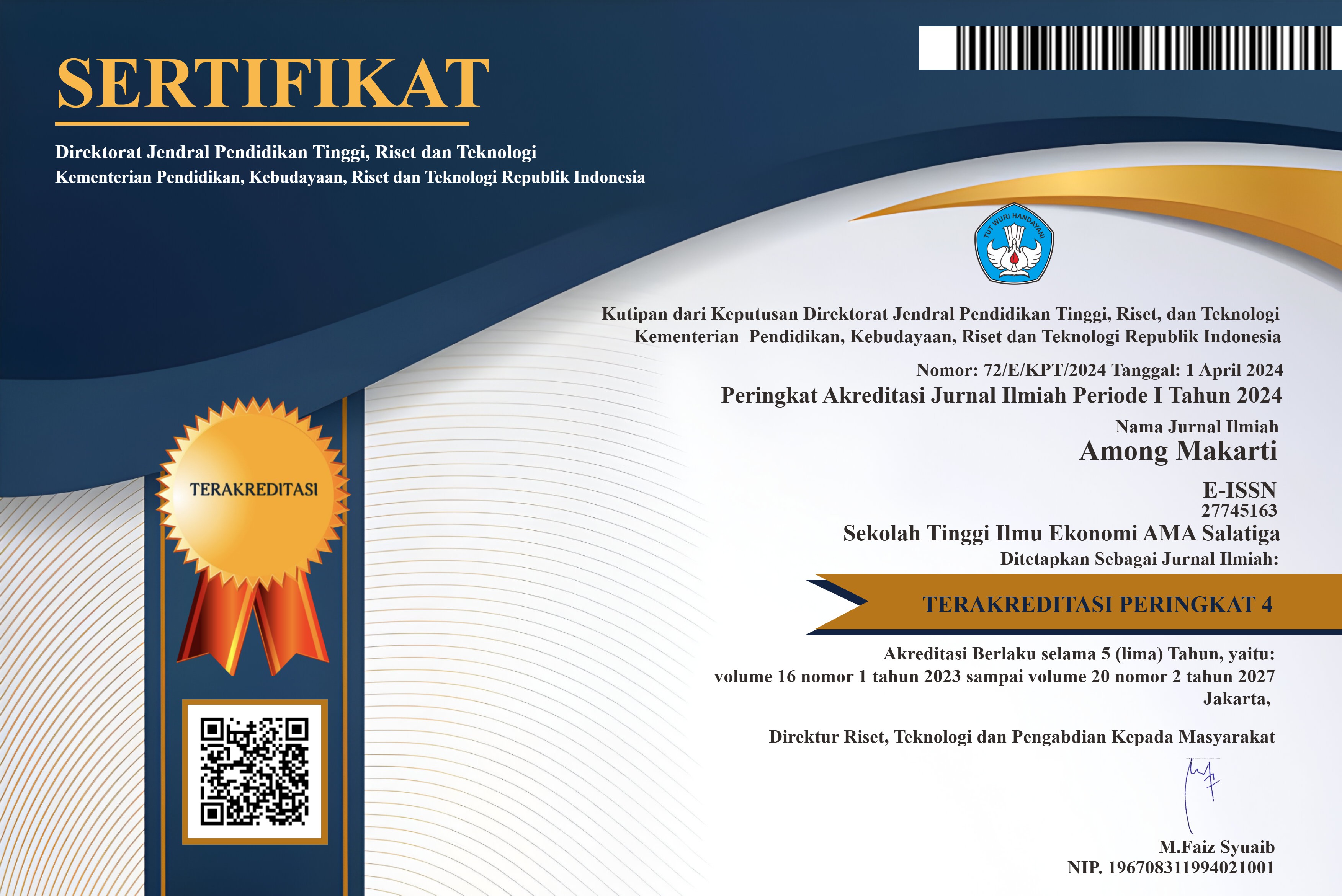STUDI EKSPLORASI EFEKTIVITAS REVERSE MENTORING TERHADAP PENGUASAAN TEKNOLOGI DI BANK (STUDI KASUS BANK X)
Abstrak
Abstract : This study aims to explore the application of Reverse Mentoring to technology mastery in a bank. The study wanted to find out how effective Reverse Mentoring is in helping technology mastery? This is interesting because unlike conventional mentoring, in Reverse Mentoring, the mentoring process is carried out by younger and junior mentors, to older and higher-ranking mentees. In the Reverse Mentoring process, young people are given strategic roles and receive support from the organization to provide mentoring to older people. This study uses a qualitative approach by conducting interviews through purposive sampling. Informants are people involved in the formulation to execution of Reverse Mentoring and users of this program. Thematic analysis was conducted to classify the data obtained. The results showed that Reverse Mentoring is effective in helping technology mastery in the Bank.
Abstrak : Studi ini bertujuan untuk mengeksplorasi penerapan Reverse Mentoring terhadap penguasaan teknologi di sebuah bank. Penelitian ingin mengetahui seberapa efektif Reverse Mentoring dalam membantu penguasaan teknologi? Ini menarik karena berbeda dengan mentoring konvensional, dalam Reverse Mentoring, proses mentoring dilakukan oleh mentor yang lebih muda dan junior, terhadap mentee yang lebih tua serta lebih tinggi secara jabatan. Dalam proses Reverse Mentoring, anak muda diberikan peran strategis dan memperoleh dukungan dari organisasi untuk memberikan mentoring kepada yang lebih tua. Penelitian ini menggunakan pendekatan kualitatif dengan melakukan wawancara melalui purposive sampling. Informan adalah orang yang terlibat dalam perumusan hingga eksekusi Reverse Mentoring serta user dari program ini. Analisis tematik dilakukan untuk mengklasifikasikan data yang didapat. Hasilnya, Reverse Mentoring efektif dalam membantu penguasaan teknologi di Bank.
Kata Kunci
Teks Lengkap:
PDFReferensi
Ardianto, R., Ramdhani, R. F., Apriliana Dewi, L. O., Prabowo, A., Saputri, Y. W., Lestari, A. S., & Hadi, N. (2024). Transformasi Digital dan Antisipasi Perubahan Ekonomi Global dalam Dunia Perbankan. MARAS: Jurnal Penelitian Multidisiplin, 2(1), 80–88. https://doi.org/10.60126/maras.v2i1.114
Arun, K., & Kahraman Gedik, N. (2022). Impact of Asian cultural values upon leadership roles and styles. International Review of Administrative Sciences, 88(2), 428–448. https://doi.org/10.1177/0020852320935982
Baker, S. E., & Edwards, R. (2012). How many qualitative interviews is enough? Expert voices and early career reflections on sampling and cases in qualitative research. National Centre for Research Methods. https://eprints.ncrm.ac.uk/2273/
Bank Indonesia. (2024). Survei Perbankan Triwulan I 2024: Penyaluran Kredit Baru Tumbuh Positif. Departemen Komunikasi Bank Indonesia.
Bayu Prawira Hie. (2021). Panduan Transformasi Digital Bank Di Indonesia. MNC Publishing.
BPS. (2023). Jumlah Bank dan Kantor Bank (Unit), 2023. https://www.bps.go.id/id/statistics-table/2/OTM3IzI=/jumlah-bank-dan-kantor-bank.html
Bradley, J., Loucks, J., Macaulay, J., Noronha, A., & Wade, M. (2015). An IMD and Cisco Initiative Digital Vortex How Digital Disruption Is Redefining Industries Digital Vortex. Global Center for Digital Business Transformation.
Chaudhuri, S., & Ghosh, R. (2012). Reverse mentoring: A social exchange tool for keeping the boomers engaged and millennials committed. Human Resource Development Review, 11(1), 55–76. https://doi.org/10.1177/1534484311417562
Clarke, A. J., Burgess, A., van Diggele, C., & Mellis, C. (2019). The role of reverse mentoring in medical education: Current insights. In Advances in Medical Education and Practice (Vol. 10, pp. 693–701). Dove Medical Press Ltd. https://doi.org/10.2147/AMEP.S179303
Clutterbuck, D. (2023). Coaching and Mentoring: A Journey Through the Models, Theories, Frameworks and Narratives of David Clutterbuck. Routledge.
Gubler, S. M. (2019). Reverse Mentoring in the Classroom: A Qualitative Study. Brigham Young University.
Hieker, C., & Rushby, M. (2020). Key success factors in implementing sustainable mentor programmes in large organisations. International Journal of Evidence Based Coaching and Mentoring, 18(2), 197–208. https://doi.org/10.24384/sx88-eh86
Holmes, R. (2018). Reverse mentoring is the technique that helps managers as much as their employees. Quartz at Work.
Israni, B. (2022). Reverse Mentoring (RM) an Effective Way to Advance the Principles of Equality, Diversity, and Inclusion Across Universities: a Systematic Review of Literature (SLR). Proceedings of the 2nd. EUt+ International Conference on Equality, Diversity and Inclusion. https://doi.org/10.21427/w5ts-4k96
Jordan, J. , S. M. (2019). Why Junior Employees Should Mentor Senior Employees. Harvard Business Review.
Koopman, R., Englis, P. D., Ehgrenhard, M. L., & Groen, A. (2021). The Chronological Development ofCoaching and Mentoring: Side by SideDisciplines. International Journal of Evidence Based Coaching and Mentoring, 19(1), 137–151. https://doi.org/10.24384/3w69-k922
KPMG. (2019). The Future of Digital Banking. KPMG International.
Sahoo, R. K. (2022). Interview as a Tool for Data Collection in Educational Research. Tools of Data Collection in Educational Research. https://www. researchgate. net/publication/360313105_Interview_as_a_Tool_for_Data_Collection_in_Educational_Research.
Nasfi, N., Solikin, A., Irdiana, S., Nugroho, L., Widyastuti, S., Luhukay, J. M., ... & Riyaldi, M. H. (2022). Uang Dan Perbankan. Widina Bhakti Persada Bandung.
Nasution, A. F. (2023). Metode penelitian kualitatif, Harfa Creative.
Nielsen. (2014). Millennials: Technology = Social Connection. https://www.nielsen.com/insights/2014/millennials-technology-social-connection/
OJK. (2021). Blueprint for Digital Transformation in Banking. Banking Research and Regulation Depertment Indonesia Financial Services Authority.
Rozali, Y. A. (2022). Penggunaan Analisis Konten danAnalisis Tematik. In Penggunaan Analisis Konten dan Analisis Tematik Forum Ilmiah (Vol. 19). www.researchgate.net
Senadjki, A., Au Yong, H. N., Ganapathy, T., & Ogbeibu, S. (2024). Unlocking the potential: the impact of digital leadership on firms’ performance through digital transformation. Journal of Business and Socio-Economic Development, 4(2), 161–177. https://doi.org/10.1108/jbsed-06-2023-0050
T. Kody Frey. (2021). Overcoming Technological Barriers to Instruction: Situating Gen Z Students as Reverse Mentors. Frontiers in Communication.
Türk, A. (2023). Digital leadership role in developing business strategy suitable for digital transformation. Frontiers in Psychology, 13. https://doi.org/10.3389/fpsyg.2022.1066180
Vives, X., Capobianco, A., & Claessens, S. (2019). Digital Disruption in Banking. https://www.investopedia.com/terms/c/client-centric.asp;
Westerman, George., Bonnet, Didier., & McAfee, Andrew. (2014). Leading digital : turning technology into business transformation. Harvard Business Review Press.
Zauchner-Studnicka, S. A. (2017). A model for reverse-mentoring in education. International Journal of Educational and Pedagogical Sciences, 11(3), 551-558.
DOI: http://dx.doi.org/10.52353/ama.v17i2.747
Refbacks
- Saat ini tidak ada refbacks.
Copyright (c) 2024 Iwan Pramana, Sammy Kristamuljana

This work is licensed under a Creative Commons Attribution-ShareAlike 4.0 International License.
AMONG MAKARTI : JURNAL EKONOMI DAN BISNIS
SEKOLAH TINGGI ILMU EKONOMI AMA SALATIGA
 Jl. Diponegoro No.39, Salatiga, Kec. Sidorejo, Kota Salatiga, Jawa Tengah
Jl. Diponegoro No.39, Salatiga, Kec. Sidorejo, Kota Salatiga, Jawa Tengah
TERINDEKS :

This work is licensed under a Creative Commons Attribution-ShareAlike 4.0 International License.



























